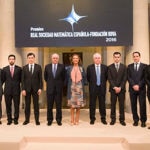Six young mathematicians win the Vincent Caselles Awards for their contributions to progress through science
Progress in quality of life depends, largely, on the continuous generation of mathematical advances. Under this premise, the BBVA Foundation and the Royal Spanish Mathematical Society(RSME) presented, on October 3, the Vincent Caselles Mathematical Research Awards, created by both companies in 2015 to boost the research of young Spanish mathematicians or those trained in Spain.

The six winning researchers were distinguished for solving problems creatively, with a critical sense and a mastery of a science that is part of the DNA of other sciences: mathematics. They all represent a generation of researchers who are enriching the academic and business worlds as they are able to find solutions that enable innovation.
In this second edition, the winners were Francesc Castellà, José Conde, Jesús Yepes, Leonardo Colombo, Martín López and Roger Casals, who has also been distinguished with the José Luis Rubio de Francia Award, the RSME’s most important award worth 3,000 euros and the Start-Up Grant, a 35,000 euro handout for a three-year research project, which the BBVA Foundation grants to the winner of this award.
Roger Casals works in the Department of Mathematics at the Massachusetts Institute of Technology (MIT) in Boston (USA) and has proved Chern’s conjecture for five-dimensional varieties, which was open for half a century. In this researcher’s opinion, the progress of a civilization is also measured by mathematical development: “If by progress we mean technological, medical and industrial progress… mathematics is a tool to solve problems that arise in these areas. Mathematics underlies much of development.”

Galardonados en los Premios Vicent Caselles
Francesc Castellà, José Conde and Jesús Yepes have been distinguished, as has happened with Casals, for exploring and seeking solutions to mathematical problems formulated decades ago. Meanwhile, Leonardo Colombo and Martín López conduct research that is more attached to the tangible world; the first in the field of exoskeletons and the second in the spread of hospital infections.
The findings of the six awardees are important, not only to the field of mathematics, but also in the labor market: “In the workplace it has been realized that us mathematicians have been trained thoroughly to think, to reason, to solve problems, to find the optimal solution to a problem. These qualities are very useful in the workplace,” explains Yepes. There are other aspects of mathematics that may be beneficial for those who are not specialists in this field: “As mathematicians, we have to develop this critical attitude when faced with a problem, and it’s an attitude that can be transferred naturally to other areas of life” Castellà notes.
At this awards ceremony the RSME medals were also presented, which is public recognition to professionals who have excelled for their important mathematical contributions. In this case, the winners were José Bonet, Professor of Applied Mathematics at the Polytechnic University of Valencia; María Gaspar, professor at the Complutense University in Madrid and María Teresa Lozano, Professor of Geometry and Topology at the University of Zaragoza.